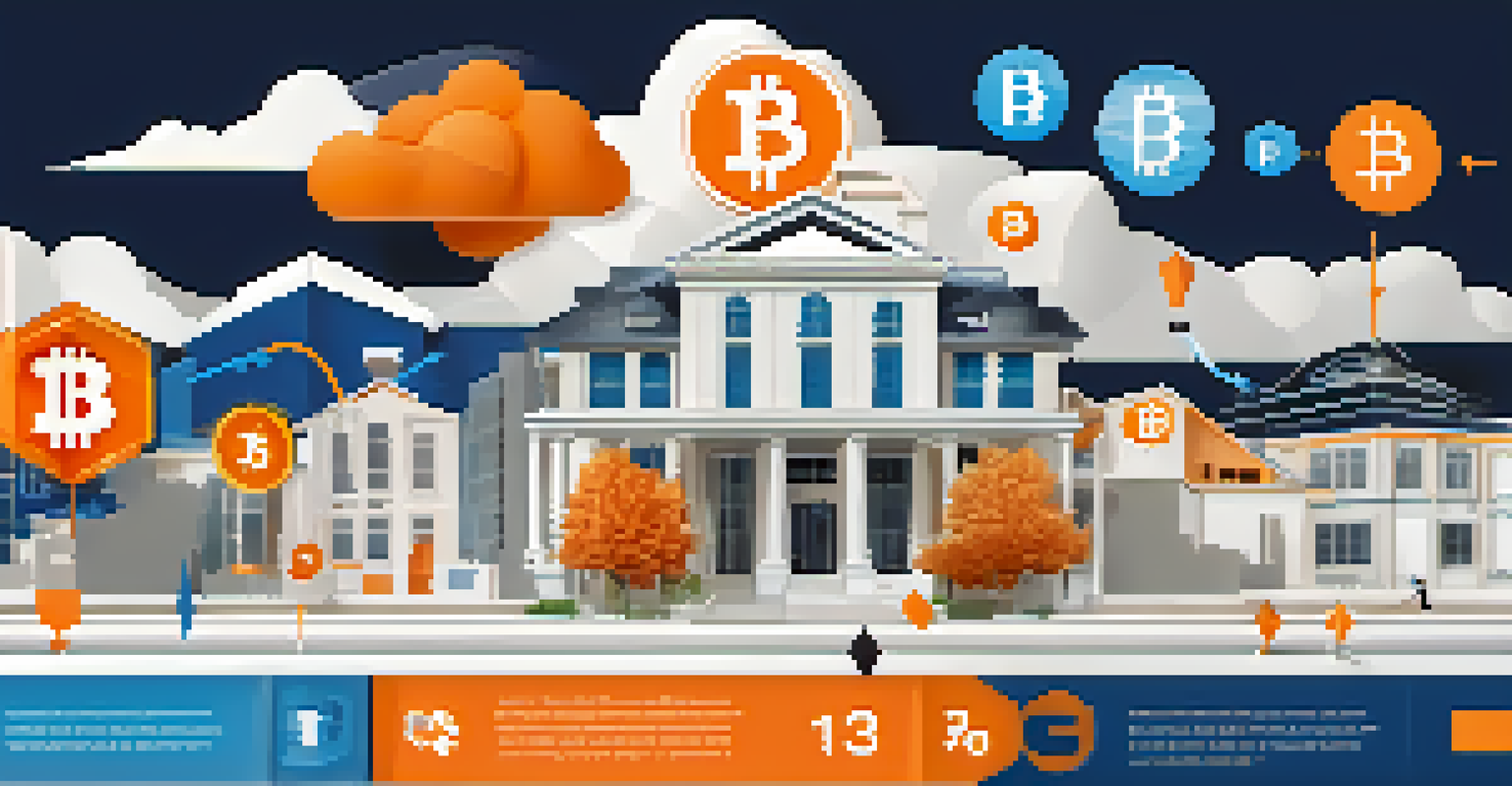The Impact of Bitcoin on Real Estate Market Trends

Understanding Bitcoin and Its Rise in Popularity
Bitcoin, a decentralized digital currency, has gained significant traction since its inception in 2009. This rise is often attributed to its potential for high returns and its role as a hedge against inflation. As more individuals and institutions invest in Bitcoin, its impact on various markets, including real estate, becomes increasingly relevant.
Bitcoin is a technological tour de force.
The allure of Bitcoin lies in its limited supply and the growing acceptance among businesses and consumers. For many, it offers a new avenue for transactions, especially in industries like real estate that traditionally rely on fiat currencies. This shift in payment methods is not just a trend; it represents a fundamental change in how financial transactions are perceived and executed.
With Bitcoin's popularity surging, real estate markets are beginning to adapt. Some property sellers now accept Bitcoin as a legitimate form of payment, reflecting a growing trust in cryptocurrency. This acceptance marks a significant milestone in the evolution of the real estate market.
How Bitcoin Transactions are Reshaping Real Estate Deals
The introduction of Bitcoin into real estate transactions simplifies the buying process. By using Bitcoin, buyers can bypass traditional banking hurdles, such as lengthy approval times and high fees. This efficiency can lead to quicker closings and less frustration for both buyers and sellers.

Moreover, Bitcoin transactions offer a degree of anonymity that appeals to many purchasers. In an age where privacy is increasingly valued, the ability to conduct transactions without revealing personal information can be a significant advantage. This feature can attract a diverse range of buyers who may prefer discretion.
Bitcoin Simplifies Real Estate Deals
Using Bitcoin allows buyers to bypass traditional banking hurdles, leading to faster transactions and reduced fees.
Additionally, the volatility of Bitcoin prices introduces a unique dynamic. While some may view this as a risk, others see it as an opportunity for investment growth. As the market stabilizes over time, Bitcoin could become a more reliable alternative for property transactions.
Influence of Bitcoin on Property Valuation Techniques
As Bitcoin gains a foothold in real estate, property valuation methods are evolving. Traditional appraisals often rely on comparable sales in local markets; however, the introduction of Bitcoin can lead to new metrics. For instance, properties sold for Bitcoin may require adjustments to account for currency fluctuations.
The future of money is digital currency.
Innovative valuation models are emerging that incorporate crypto assets into the overall worth of a property. This shift can help ensure that sellers are fairly compensated, regardless of the currency used for the transaction. Understanding these new valuation techniques is crucial for real estate professionals navigating this landscape.
Additionally, blockchain technology, which underpins Bitcoin, offers an immutable record of transactions. This transparency can enhance trust in property valuations, providing buyers and sellers with a clearer understanding of a property’s worth. As these practices become more mainstream, they will further shape the real estate market.
The Role of Blockchain in Real Estate Transactions
Blockchain technology, the backbone of Bitcoin, is revolutionizing real estate transactions. By providing a secure and transparent way to record property transfers and ownership, blockchain enhances the efficiency of the buying and selling process. This can significantly reduce fraud and disputes, which are common in traditional transactions.
Smart contracts, powered by blockchain, automate the execution of agreements when predetermined conditions are met. This means that once a buyer fulfills the terms of a sale, the property transfer is executed automatically. This technology can streamline processes, reducing the need for intermediaries like real estate agents and lawyers.
Blockchain Enhances Trust in Transactions
The transparency of blockchain technology reduces fraud and helps establish a clearer understanding of property valuations.
As real estate professionals begin to embrace blockchain, we may see a shift toward a more decentralized marketplace. This could lead to significant cost savings for buyers and sellers alike, making real estate transactions more accessible and efficient.
Challenges and Risks of Using Bitcoin in Real Estate
Despite its advantages, using Bitcoin in real estate comes with challenges. The most prominent issue is the volatility of Bitcoin prices, which can fluctuate dramatically in a short period. This unpredictability can create anxiety for buyers and sellers, as the value of a transaction can change significantly before it’s completed.
Additionally, regulatory concerns loom large. Many governments are still figuring out how to approach cryptocurrencies, and fluctuating regulations can create uncertainty. Real estate professionals must stay informed about legal requirements to ensure compliance when accepting Bitcoin as payment.
Lastly, there is the risk of technological barriers. Not every buyer or seller is familiar with Bitcoin or how to use it. This knowledge gap can deter potential participants from engaging in Bitcoin transactions. Educating stakeholders about this digital currency is essential for its broader acceptance in the real estate market.
Case Studies: Bitcoin Transactions in Real Estate
Several notable case studies illustrate the growing trend of Bitcoin in real estate. For example, in 2017, a luxury apartment in Miami was sold for Bitcoin, marking one of the first high-profile transactions of its kind. This event captured the attention of the industry and highlighted the potential for cryptocurrency in high-value property markets.
Another case involved a real estate firm that began accepting Bitcoin for its properties and reported a surge in interest from tech-savvy investors. This firm demonstrated that by embracing innovation, they could attract a new clientele eager to explore alternative payment options.
Bitcoin's Volatility Presents Risks
The unpredictable nature of Bitcoin prices can create anxiety for buyers and sellers during real estate transactions.
These case studies not only showcase successful transactions but also signal a shift in how real estate is perceived. As more success stories emerge, they pave the way for a broader acceptance of Bitcoin within the industry, encouraging others to follow suit.
The Future of Bitcoin in the Real Estate Market
Looking ahead, the future of Bitcoin in real estate appears promising. As technology continues to evolve and more people become familiar with cryptocurrencies, we can expect to see increased adoption in real estate transactions. This shift could lead to more innovative payment solutions and financing options.
Additionally, as the market matures, we may witness the development of new regulatory frameworks that support Bitcoin transactions. Clear regulations can enhance trust among stakeholders, making it easier for buyers and sellers to engage confidently in cryptocurrency-based deals.

Ultimately, Bitcoin has the potential to transform the real estate landscape significantly. By bridging the gap between traditional and digital currencies, it could create a more inclusive market that accommodates a diverse range of buyers and sellers for years to come.